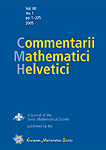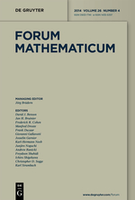
Journal of the Ramanujan Mathematical Society
Scope & Guideline
Fostering a Community of Mathematical Scholars
Introduction
Aims and Scopes
- Number Theory:
The journal frequently publishes papers that delve into the intricacies of number theory, including topics such as partition functions, L-functions, and congruences. - Algebraic Geometry:
Many articles explore algebraic structures and geometric properties, including the study of varieties, ideals, and representation theory. - Graph Theory and Combinatorics:
Research on graph properties, combinatorial structures, and their applications is a significant focus, showcasing the interplay between algebra and discrete mathematics. - Representation Theory:
The journal includes work on the representation theory of groups, particularly in relation to modular forms and automorphic representations. - Mathematical Analysis:
Papers in this area investigate analytical methods and their applications across various mathematical contexts, contributing to the field's foundational theories. - Dynamical Systems and Number Theory:
The journal also features research on dynamical systems, particularly those connected to number-theoretical constructs and their implications.
Trending and Emerging
- Modular Forms and Their Applications:
Recent publications highlight a growing interest in modular forms, particularly their properties and applications to number theory and algebraic geometry. - Algebraic Structures in Modern Mathematics:
There is an increasing trend in exploring complex algebraic structures, including those related to nilpotent groups and algebraic groups, showcasing a deeper engagement with abstract algebra. - Computational Techniques in Mathematics:
The application of computational methods and algorithms in mathematical research is becoming more prominent, reflecting the need for practical techniques in solving complex problems. - Interdisciplinary Approaches:
Emerging themes often bridge various mathematical disciplines, indicating a trend towards interdisciplinary research that integrates concepts from different areas, such as algebra, geometry, and number theory. - Higher-Dimensional Algebra and Geometry:
There is a noticeable increase in research focusing on higher-dimensional spaces and their algebraic properties, which aligns with contemporary mathematical explorations.
Declining or Waning
- Classical Geometry:
Papers focusing on classical geometric concepts and properties have become less frequent, as the journal's emphasis shifts towards modern algebraic and combinatorial approaches. - Elementary Number Theory:
While still significant, traditional topics in elementary number theory, such as basic divisibility and prime distribution, appear to be receiving less attention in favor of more advanced topics. - Real Analysis:
Research specifically centered on real analysis has diminished, possibly as mathematicians explore more abstract or higher-dimensional analytical frameworks. - Historical Mathematical Studies:
Studies focusing on the historical aspects of mathematics and its development are increasingly rare, indicating a trend toward contemporary mathematical research.
Similar Journals

Analele Stiintifice ale Universitatii Ovidius Constanta-Seria Matematica
Advancing Mathematical Frontiers with Open Access InsightAnalele Stiintifice ale Universitatii Ovidius Constanta-Seria Matematica is a prominent open-access journal established by OVIDIUS UNIV PRESS in Romania, dedicated to advancing the fields of mathematics, specifically in Analysis and Applied Mathematics. Since its inception, the journal has emphasized the dissemination of high-quality research, making it accessible to a global audience. With an ISSN of 1224-1784 and E-ISSN 1844-0835, it has positioned itself within the academic community, achieving a respectable Q3 ranking in both analysis and applied mathematics in 2023, reflecting its commitment to rigorous scholarship. The journal spans a considerable publication window from 2009 to 2024, catering to the ongoing developments in mathematical sciences and their applications. Researchers, professionals, and students alike will find valuable insights and contributions that enrich their understanding and foster collaboration within the mathematical community. The journal's headquarters is based at the Faculty of Mathematics & Computer Science, Bulevardul Mamaia 124, Constanta, Romania.

MANUSCRIPTA MATHEMATICA
Connecting Scholars through Rigorous Peer Review.MANUSCRIPTA MATHEMATICA is an esteemed journal in the field of mathematics, published by Springer Heidelberg. Since its inception in 1969, this journal has served as a pivotal platform for disseminating high-quality research in a variety of mathematical disciplines, with a commitment to advancing knowledge and fostering collaboration among mathematicians. The journal holds a commendable impact factor and is ranked within the Q2 category for Mathematics (miscellaneous) in 2023, placing it favorably among its peers in terms of academic influence. Although open access options are not available, its rigorous peer-review process ensures that published articles maintain the highest academic standards. With a wide scope covering significant areas of general mathematics, MANUSCRIPTA MATHEMATICA not only caters to researchers and professionals seeking innovative insights but also serves as a valuable resource for students eager to deepen their understanding of mathematical theories and applications. For those looking to contribute to or stay informed about advancements in this dynamic field, the journal remains a crucial resource for literature and discourse.

JOURNAL OF THE KOREAN MATHEMATICAL SOCIETY
Elevating the discourse in mathematics globally.JOURNAL OF THE KOREAN MATHEMATICAL SOCIETY is a premier academic publication dedicated to advancing the field of mathematics through rigorous research and scholarly discourse. Published by the esteemed Korean Mathematical Society, this journal provides a platform for mathematicians and researchers to disseminate their findings, engage in innovative ideas, and connect with the global mathematical community. With an ISSN of 0304-9914 and E-ISSN 2234-3008, the journal has established itself as an important resource in the mathematical landscape, currently holding a Q3 classification in the ‘Mathematics (miscellaneous)’ category as per the 2023 rankings. Though not open access, the journal is committed to promoting high-quality contributions that span various mathematical disciplines, making it indispensable for students, researchers, and professionals alike. Operating from its base in Seoul, South Korea, it contributes to the international mathematics community by publishing cutting-edge research from 1997 to 2024 and beyond, facilitating an avenue for knowledge sharing and innovation in mathematics.

Forum of Mathematics Sigma
Innovative research, limitless possibilities.Forum of Mathematics Sigma is a premier open access journal published by Cambridge University Press that has been at the forefront of mathematical research since its inception in 2013. With a strong emphasis on advancing the fields of mathematics, the journal consistently achieves Q1 rankings across multiple categories, including Algebra and Number Theory, Analysis, and Computational Mathematics. This distinction highlights its impact and relevance within the scholarly community. The journal prides itself on providing a platform for innovative research, fostering collaboration among researchers and practitioners across various mathematical disciplines. Open access publication ensures that cutting-edge findings are widely available to readers globally, enhancing the dissemination of knowledge. With an address in the heart of Cambridge, England, Forum of Mathematics Sigma is dedicated to promoting high-quality research and making significant contributions to the development of mathematics.

ANNALS OF MATHEMATICS
Exploring New Dimensions in Mathematics and StatisticsANNALS OF MATHEMATICS is a prestigious peer-reviewed journal published by the Department of Mathematics at Princeton University, dedicated to the advancement of mathematical research across diverse fields, including mathematics, statistics, and probability. With an impressive impact factor reflecting its critical role in the academic community, this journal is categorized within the Q1 quartile rankings for both Mathematics and Statistics in 2023, evidencing its high circulation of influential and often-cited publications. Researchers can access the latest findings and theoretical advancements in an environment that fosters intellectual discourse and innovation, although the journal does not currently offer open access. Spanning a remarkable convergence period from 1996 to 2024, the ANNALS OF MATHEMATICS serves as a vital resource for mathematicians, statisticians, and analysts striving to push the boundaries of knowledge and application in these critical fields.

COMMENTARII MATHEMATICI HELVETICI
Fostering Global Collaboration in Mathematical ExplorationCOMMENTARII MATHEMATICI HELVETICI, published by the EUROPEAN MATHEMATICAL SOCIETY, is a premier open-access journal in the field of mathematics, specifically categorized within the Q1 quartile of miscellaneous mathematics as of 2023. With an ISSN of 0010-2571 and an E-ISSN of 1420-8946, this esteemed journal has a rich history, having commenced its publication journey in 1929 and set to continue until at least 2024. Based in Germany, it provides a valuable platform for original research and significant advancement in mathematical theory and application, appealing to researchers, professionals, and students alike. The journal's commitment to open access since 2022 further enhances its accessibility and outreach, ensuring that cutting-edge mathematical developments are readily available to a global audience. Its Scopus ranking, which places it at the 165th position out of 399 in the general mathematics category (58th percentile), exemplifies its impact and relevance in the academic community.

CANADIAN JOURNAL OF MATHEMATICS-JOURNAL CANADIEN DE MATHEMATIQUES
Fostering collaboration and innovation in mathematics.Canadian Journal of Mathematics - Journal Canadien de Mathématiques is a prestigious peer-reviewed journal published by Cambridge University Press, which aims to advance the field of mathematics through the dissemination of high-quality research articles. With its ISSN 0008-414X and E-ISSN 1496-4279, the journal plays a pivotal role in fostering mathematical research and collaboration. It has been recognized for its impactful contributions, currently holding a category quartile ranking of Q2 in Mathematics (miscellaneous) for 2023 and sits in the 66th percentile among its peers according to Scopus rankings. As the journal continues its convergence from its inception in 1994 through to 2024, it remains a vital resource for researchers, professionals, and students seeking to stay at the forefront of mathematical developments. The journal does not operate under an open access model, allowing for a curated collection of articles that adhere to rigorous academic standards.

European Journal of Mathematics
Unveiling New Theories and ApplicationsWelcome to the European Journal of Mathematics, a prominent publication that serves as a vital platform for disseminating high-quality research in the field of mathematics. Published by Springer International Publishing AG, this journal has witnessed significant growth since its inception in 2015 and is recognized for its contributions within the Q2 category of Mathematics (miscellaneous) as per the 2023 rankings. With an ISSN of 2199-675X and an E-ISSN of 2199-6768, the journal aims to foster innovation and collaboration among researchers, professionals, and students alike. Although it operates under a traditional access model, the journal's commitment to advancing mathematical knowledge and applications cannot be overstated. Positioned among the top-tier publications, the European Journal of Mathematics is an essential resource that encourages the exploration of emerging trends and theories in mathematics, making it indispensable for anyone striving to stay at the forefront of this dynamic field.

JOURNAL OF THE AMERICAN MATHEMATICAL SOCIETY
Pioneering Innovations in Mathematics and BeyondThe Journal of the American Mathematical Society (ISSN: 0894-0347; E-ISSN: 1088-6834), published by the American Mathematical Society, stands as a pillar in the fields of mathematics and applied mathematics. This prestigious journal, with a remarkable impact factor and ranking in the top tier (*Q1*) within both the Applied Mathematics and general Mathematics categories, is recognized for its contribution to advancing mathematical research and theory. With data reflecting it as the 8th ranked journal in General Mathematics (top 2%) and the 34th in Applied Mathematics (top 6%), the journal consistently showcases groundbreaking studies and innovative methods that greatly influence academia and industry alike. Though not an open-access journal, it offers a wealth of resources and intellectual discourse for researchers, professionals, and students alike. Specializing in comprehensive and theoretical aspects of mathematics, the Journal remains dedicated to publishing articles that promote understanding and propel the field forward, highlighting its significance as an essential tool for those engaged in mathematical research.

FORUM MATHEMATICUM
Pioneering Research in Applied and Theoretical MathematicsFORUM MATHEMATICUM, published by WALTER DE GRUYTER GMBH, is a distinguished academic journal based in Germany, known for its significant contributions to the field of mathematics. With an ISSN of 0933-7741 and an E-ISSN of 1435-5337, the journal features comprehensive studies ranging from applied mathematics to diverse mathematical disciplines. Having maintained a commendable presence since 1989, FORUM MATHEMATICUM has achieved notable classification rankings, including Q2 in Applied Mathematics and Q1 in miscellaneous Mathematics as of 2023. Additionally, it holds a Scopus rank within the top 60th percentile in General Mathematics, making it a prominent platform for researchers and professionals seeking rigorous analysis and innovative methodologies in mathematics. While the journal does not currently offer open access, its rich content is pivotal for advancing mathematical theory and applications, appealing to students and seasoned academics alike.